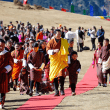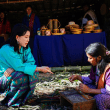For travelers seeking more than just breathtaking views and cultural landmarks, Bhutan’s homestays offer a rare and intimate window into the heart of the country. Unlike hotels or commercial lodges, homestays allow tourists to live with local families, sharing meals, conversations, customs, and even daily chores. It’s a chance to experience Bhutan not as a visitor, but as a temporary member of the community.
Across the country, from the misty highlands of Haa to the lush valleys of Bumthang and the remote eastern districts, homestays are emerging as a preferred choice for travelers in search of authenticity. Each stay offers something unique. In Paro, a guest may join their host family in preparing ema datshi, Bhutan’s fiery chili and cheese dish. In Lhuentse, they may learn about ancient weaving traditions from matriarchs who still spin thread by hand. In Trashiyangtse, a morning may begin with butter tea and end with storytelling around a wood-fired stove.

A typical day in a Bhutanese homestay begins early, with the sounds of roosters crowing and firewood crackling. Guests are often invited to join family members in lighting butter lamps at the altar, a daily ritual that sets a spiritual tone. Breakfast might include warm buckwheat pancakes, red rice porridge, or fresh cheese. Throughout the day, visitors can choose to relax or participate in whatever the family is doing, whether it’s collecting firewood, tending to livestock, or helping in the fields during harvest.
The hospitality extended by Bhutanese families is generous and sincere. Most hosts treat their guests as part of the household, often going out of their way to share family stories, local legends, and age-old wisdom passed down through generations. This kind of human connection offers a rare contrast to the polished, often impersonal service of modern tourism.

While the facilities in homestays are modest, they are comfortable. Most homes provide clean rooms with futon-style beds, warm blankets, and basic bathroom facilities. Amenities like Wi-Fi and hot showers may be limited, especially in remote areas, but travelers often find the trade-off worthwhile. The silence of the valleys, the warmth of the kitchen fire, and the genuine conversations under starlit skies more than make up for any lack of luxury.
The Bhutanese government encourages homestays as part of its commitment to sustainable and community-based tourism. Many are officially registered with the Tourism Council of Bhutan and meet certain standards of safety and hygiene. In addition to providing authentic experiences for visitors, homestays help local families generate income, preserve cultural practices, and stay connected to their communities in the face of modernization.

In an age of curated travel and social media snapshots, homestays offer something profoundly different: presence, patience, and people. They are not just places to sleep, but places to understand Bhutan from the inside out. For many who have stayed in one, it becomes the most cherished memory of their journey.







